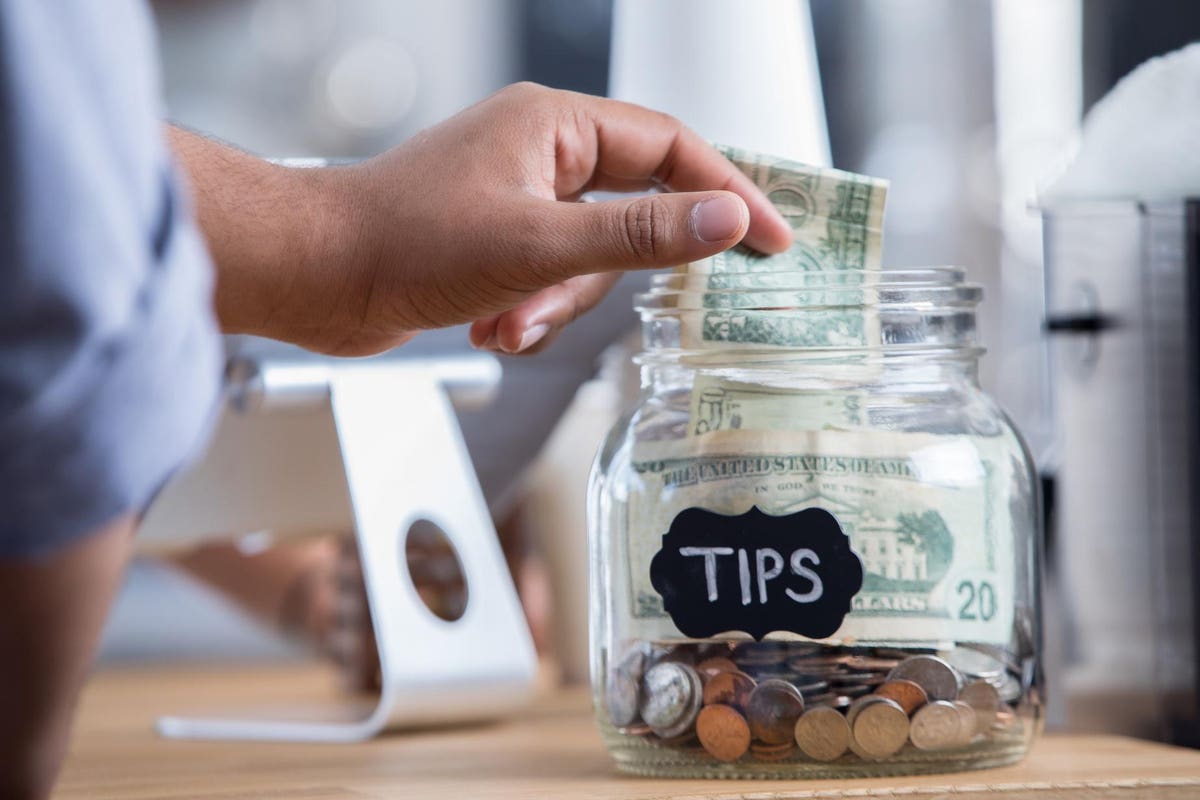The Tipping Economy: Is Tipping Out Of Control?
Share to FacebookShare to TwitterShare to LinkedinToday, it’s become an expectation in more types of businesses, regardless of the quality of the … [+] service.
getty A guest checked into a hotel and the bellman carried the guest’s bags to the room. As the bellman set the bags down, the guest asked, “What’s the usual tip?”
The bellman replied, “The usual is 10 dollars.”
The guest took a 10-dollar bill out of his wallet and handed it to the bellman who said, “Thanks! It’s been a long time since I got the usual.”
That’s an old joke, but very appropriate for today. It seems the concept of tipping is changing. More and more places you do business are expecting you to tip. It used to be that tipping was customary in the restaurant and hospitality industries. If a server, bellman, housekeeper or cab driver gave you great service, you reciprocated with a tip. Today, it’s become an expectation in more types of businesses, regardless of the quality of the service.
I recently wrote about this in my weekly customer experience newsletter. I received dozens of comments and emails. Not one of them agreed with the direction tipping and gratuities are heading. This is obviously a hot topic, so I thought I would dig a little deeper here.
First, a little history. According to Wikipedia, the practice of tipping began in medieval times in Tudor, England. In the “woke” and politically correct society we live in, the history is controversial. Tipping was a master-serf practice. Servants (serfs) would receive extra money from their masters for performing “extremely well.” It wasn’t until around 1850 that Americans started tipping, and it was mostly those of the higher social status who tipped to prove they could afford it.
Jump to modern days. It’s no longer about anyone (servers, taxi drivers, hotel staff, etc.) receiving a tip for good service. It’s now become an expectation. Just a few years ago, it was customary to tip a server in a restaurant 15%, or more if they provided outstanding service. Today, customers are being pushed to tip higher numbers, almost to the point of making customers feel uncomfortable. The new term that’s being used to describe this phenomenon is tipflation, the rising expectations of higher tips.
MORE FROMFORBES ADVISORBest Travel Insurance CompaniesByAmy DaniseEditorBest Covid-19 Travel Insurance PlansByAmy DaniseEditor In addition, there’s another new term, tip creeping, which refers to other businesses (outside of the hospitality and traditional service industries) that are now expecting customers to tip their employees. Imagine getting an oil change for your car, and when you pay for it, you are asked if you want to leave a tip. Or how about the cashier at the grocery store or the salesperson at a clothing store?
Sometimes, the request for a tip borders on being ridiculous. I picked up a candy bar and used the self-service checkout to pay. As I was finishing the transaction, I was asked if I wanted to leave a tip. The choices were 18%, 25% or 30%. There was also a very small button for a “custom tip.” Not one employee interacted with me, so who am I tipping? Or maybe the machine hopes I’ll give it a tip!
Some aggressive restaurants are now adding service charges to their bills. Just the other night I took my wife to dinner. On the bill was a 20% service charge. I asked the server if that was for the tip. She shared that it is an extra charge to take care of other employees, such as the cooks, dishwashers and others. I asked if any of it went to her. She said, “No, which is why I would appreciate it if you would leave a tip.”
I wasn’t sure how to respond. I did leave her a tip, but wondered why the restaurant would add a service charge and then expect the guest to tip. Other than for larger parties, I had never heard of an automatic service charge or gratuity added to the bill. So, I asked the owner, “What’s with the service charge? Why not raise the price? Isn’t it the same?”
Apparently not. The owner of the restaurant explained to me that if he raises his prices by 20%, the guests will complain, or worse, not come because of the higher prices. So, I guess that guests complaining about a service charge is different?
I’m comparing this service charge at the restaurant to the resort fees at a hotel. They quote a price, but you soon realize that’s not the price. Even though the price is in big, bold numbers, you have to read the smaller print to find out that doesn’t include the hotel’s resort fee, which can be fairly substantial.
Here’s an idea. The hotel room is free, but the guest has to pay a housekeeping fee, luggage fee, cleaning fee, towel fee, etc. That, by the way, adds up to about $249 per night (or whatever you usually pay for a hotel room). Other than those added service fees, the room is free … not!
This may sound like a rant, and maybe it is to a degree. I’m one of those people who feel guilty if they don’t tip. But at the same time, I’m getting tired of everyone asking for more. I feel “nickel and dimed” by the overt requests for a tip—or by extra fees that should be built into the price. I did an informal survey of friends and acquaintances. Almost everyone is in agreement about tipping getting out of control.
So, what should we do? First of all, don’t stop tipping! Don’t punish the good people working hard to serve you. But … tip appropriately—generously when deserved, but don’t feel guilty if you don’t tip according to the “suggested” options. It’s perfectly okay to tap the smaller button for the “custom tip” and put in what you feel is appropriate. And, don’t feel obligated to tip in nontraditional settings—tip creeping will only slow down if customers show some resistance. Ultimately, do what is right for you (and don’t feel guilty)!
Follow me on Twitter. Check out my website.












 Bitcoin
Bitcoin  Ethereum
Ethereum  Tether
Tether  Solana
Solana  USDC
USDC  Lido Staked Ether
Lido Staked Ether  XRP
XRP  Dogecoin
Dogecoin  Toncoin
Toncoin